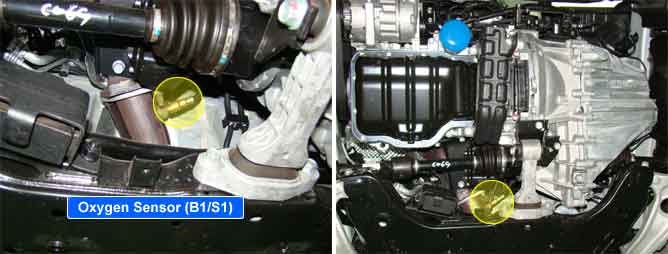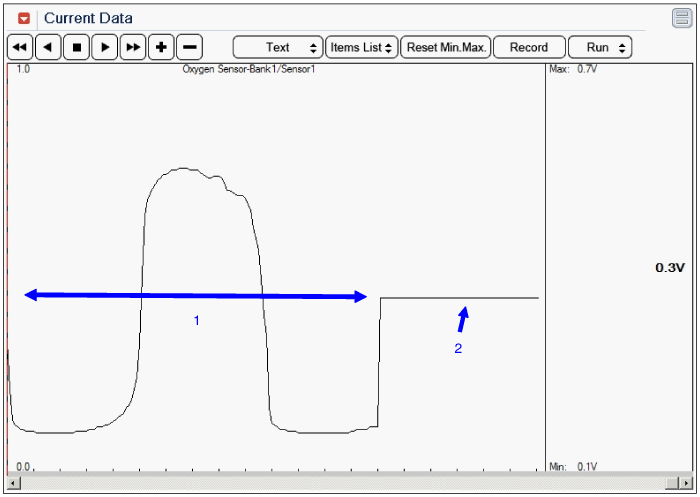


The HO2S(Heated Oxygen Sensor) is used to supply the PCM with information regarding the composition of the air/fuel mixture. The HO2S is positioned in the exhaust pipe ahead of the TWC. To measure the oxygen content, the HO2S requires a supply of ambient air as a reference. Since this is supplied through the wiring, the lead must not be clamped or damaged in any other way. The HO2S produces a voltage that varies between 0.1V and 0.9V under normal operating conditions. The Engine Control Module (PCM) monitors this voltage and determines if the exhaust gas is lean or rich. If the voltage input at the PCM is under approx. 0.45V the exhaust is lean, and if the voltage input is over approx. 0.45V the exhaust is rich. The PCM constantly monitors the HO2S signal during closed loop operation and compensates for a rich or lean condition by decreasing or increasing injector pulse width as necessary.
The linear O2 sensor is mounted on the front side of the Catalytic Converter (warm-up catalytic converter) or in the front exhaust pipe. It detects a wide range of air/fuel ratios in the exhaust gas from the rich to lean regions. This linear O2 sensor produces a current that corresponds to a specific air/fuel ratio. The PCM monitors this signal and determines whether the air/fuel mixture is rich or lean. The PCM constantly monitors the linear O2 sensor and increases or decreases the fuel injection duration using this signal. This is called closed-loop fuel control operation.
The PCM monitors the HO2S(B1/S1) transition frequency for predetermined time. During the monitoring period, the PCM calculates transition times that the front HO2S switches from rich to lean and from lean to rich. With this information, an average frequency for all switches can be determined. The PCM sets DTC P0133 when the average frequency is too slow.
The PCM monitors front oxygen sensor amplitude level and compares it to predetermined minimum amplitude value which could increase emission or disturb lambda control by the effect of aging on the oxygen sensor. The PCM sets DTC P0133 when the amplitude of oxygen sensor is equal to or less than minimum amplitude threshold.
Item | Detecting Condition | Possible Cause |
DTC Strategy |
•
Check Lambda control regulation frequency | 1. Leak in intake or exhaust system 2. Poor connection or damaged harness 3. HO2S contamination |
Enable Conditions |
•
Coolant temperature >73℃(163℉)
•
550℃(1022℉)< Catalyst temperature model <850℃(1562℉)
•
Vehicle speed >3mph
•
1300< Engine speed(rpm) <3200rpm
•
0.3g/rev.< MAF <0.8g/rev.
•
Canister load <0.5
•
Lambda control active
•
Stable driving condition
•
No opening/closing of canister purge valve
•
70kPa(700hPa)< Ambient pressure
•
No relevant failure
•
11V< Battery voltage <16V | |
Threshold Value |
•
Average Ratio between measured and maximum allowed frequency >1 | |
Diagnostic Time |
•
50 lambda controller cycles | |
Mil On Condition |
•
2 Driving Cycles |
Item | Detecting Condition | Possible Cause |
DTC Strategy |
•
Check HO2S Signal Amplitude | 1. Leak in intake or exhaust system. 2. Poor connection or damaged harness 3. HO2S contamination |
Enable Conditions |
•
see catalyst diagnosis(P0420) activation condition
•
No relevant failure
•
11V < Battery voltage < 16V | |
Threshold Value |
•
Integral ( Lambda signal amplitude measured / Lambda signal amplitude of a slow sensor ) > 1.0 | |
Diagnostic Time |
•
25 lambda controller cycle | |
Mil On Condition |
•
2 Driving Cycles |
BINARY
LINEAR
Test Condition | GDS Parameter | ||
O2 SNSR VOL.-B1/S1 | O2 SNSR VOL.-B1/S2 | ||
Normal Value when circuit is normal | Idle after warm up | Signal is switching from rich(above 0.45V) to lean(below 0.45V) a minimum of 3 times in 10 seconds. | above 0.7V |
HO2S(B1S1) signal circuit open | Approx. 0.43~0.45V | - | |
HO2S(B1S2) signal circuit open | - | Approx. 0.43~0.45V | |

1. Normal value with idle after warm up : Signal is switching from rich(above 0.45V) to lean(below 0.45V) a minimum of 3 times in 10 seconds.
2. GDS display with open in signal circuit : Approx. 0.43~0.45V